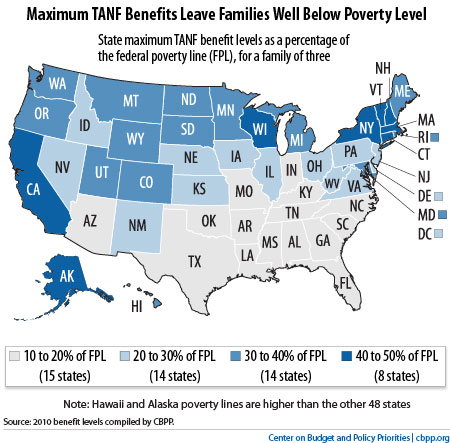The Center for Budget and Policy Priorities is a left-wing group in Washington that advocates for bigger government and higher taxes. In an effort to promote more redistribution, they recently put together a map showing how welfare benefits varied by state.
We’re supposed to look at the map and conclude that welfare benefits are too low, but I draw the opposite conclusion. I’m stunned that some states are providing welfare checks greater than 30 percent of the poverty level. And some are even sending out checks greater than 40 percent of the poverty level.
 The folks at CBPP conveniently neglect to mention two critical pieces of information.
The folks at CBPP conveniently neglect to mention two critical pieces of information.
1. The poverty line is set considerably above a level that would indicate material deprivation. According to Census Bureau data, for instance, a single person with income of $11,139 is considered in poverty and a family of four with income of $22,113. That’s far above the average level of income in most nations of the world.
2. Welfare checks are just one of many forms of redistribution, and the data used to create the map do not count food stamps, Medicaid, housing subsidies and a plethora of other means-tested programs. As Robert Rector of the Heritage Foundation has documented, poor people experience surprisingly high levels of consumption.
This is not to say that life is easy for people living off the government. But it also true that the left is being disingenuous when they try to convince people that more redistribution is necessary to keep people from third world-style suffering.
The real tragedy of the welfare state, however, goes well beyond the fiscal burden. The human toll is far worse, as redistribution subsidizes dysfunctional behavior and traps people in dependency.
The problem could be partially fixed by getting the federal government out of the business of income redistribution. Welfare reform in the 1990s moved the ball in the right direction, and that success could be replicated by block-granting Medicaid and adopting other policies that put state and local governments back in charge.
But federalism is only part of the answer. The best way of dealing with poverty is economic growth, which is the point I make in this online video debate for PBS.
But welfare bureaucracies don’t have much incentive to actually reduce poverty. After all, as Walter Williams has explained, the so-called War on Poverty is a great gig for the tens of thousands of bureaucrats who get to oversee the programs.
